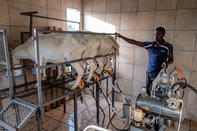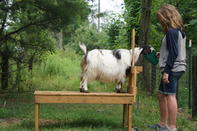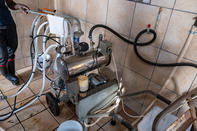On a well-managed farm, the first kid can be born when the ewe is about 12 months old. The ewe will be lactating (producing milk) for the kid to feed on - this will be the start of the milking cycle.

Lactation will last about 10 months after kidding. Goat milk production peaks in the first month or two after kidding. Colostrum, the first milk from the udder, is vital for the baby goat’s immune system.
Kids can be taken away from their mothers after a week and reared separately, on about 1 litre of milk per day, milk substitutes can also be used. The high yielding Saanen goat could produce 1 200 l of milk over a ten month period. A goat’s lifetime productivity depends on her fertility, milk yield, disease (does she get mastitis) and body shape such as firm udder and strong legs.
Equipment for Milking Goats

When hand-milking goats one would need a clean place to milk, water and a clean bucket. A milking stand can also be purchased. Milking should be a pleasant experience for the goats - give them some food while you are milking.
Milk goats should be handled gently and with care. Milking by hand is very tiring and the average milker may become too tired if he has to milk goats for longer than two hours. Consider buying a milking machine but beware of buying a machine, which may soon be too small.
Milk must be cooled down as fast as possible to 4°C. In the case of large quantities of milk consider buying a cooling tank large enough to accommodate increased future milk production.
Milk Hygiene

As with any kind of milk, hygiene is of the utmost importance. The milk must be as clean as possible and must be cooled down and kept at 4°C. There are always some bacteria in raw milk, so hygienic practices are strictly followed. Unless milk is kept cold (less than 4ºC) bacteria will multiply quickly and spoil the milk.
The best thing to do is to heat the milk, and in this way kill any bacteria that may be in it. It is not necessary to bring the milk to the boil as this will change the flavour of milk. However, if it is held at 63ºC for 30 minutes, the bacteria will be killed, but the flavour and food value will be hardly changed, if at all. This process is called pasteurization. Modern pasteurization machines heat to 73ºC for 15 seconds.